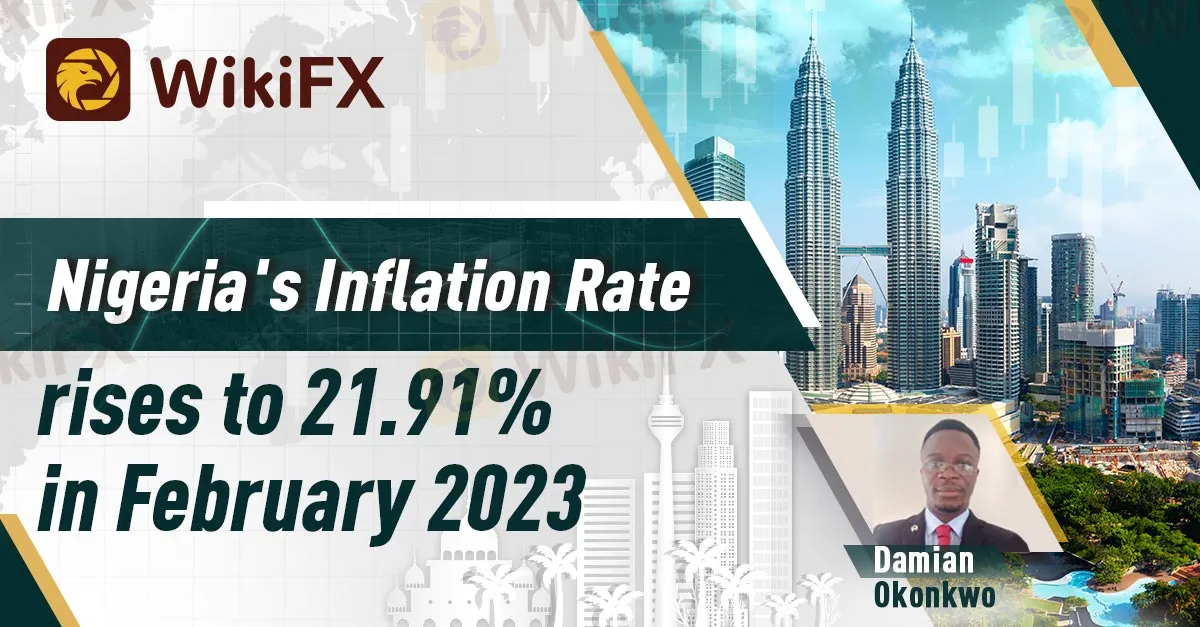简体中文
繁體中文
English
Pусский
日本語
ภาษาไทย
Tiếng Việt
Bahasa Indonesia
Español
हिन्दी
Filippiiniläinen
Français
Deutsch
Português
Türkçe
한국어
العربية
Nigeria's Inflation Rate rises to 21.91% in February 2023
Abstract:Nigeria's inflation rate increased to 21.91% in February marking a second consecutive increase since 2023.

By: Damian Okonkwo

Nigerias inflation rate has continued its upward trajectory, rising to 21.91% in February 2023, according to data released by the National Bureau of Statistics (NBS) last week.
This marks the second consecutive month that the inflation rate has risen, and it is the highest it has been since April 2018. In January 2023, the inflation rate stood at 21.82 last month, indicating an increase of 0.09 percent. This is based on the information disclosed by the National Bureau of Statistics, NBS, last week's Wednesday.
On a year-on-year (YoY) basis, the inflation rate was 6.21 percent higher compared to the rate recorded in February 2022, which stood at 15.7 percent.
The higher increase in inflation was driven by the increase in food prices. The food inflation rate rose to 24.35 percent on a YoY basis in February which is 7.24 percent higher compared to the rate recorded in February 2022 when it stood at 17.1 percent.
The NBS attributed the rise in food prices to a combination of factors, including supply chain disruptions caused by insecurity in some parts of the country, as well as the high cost of transportation.
The core inflation rate, which excludes the prices of volatile agricultural produce, also increased to 16.56% in February 2023, compared to 16.05% in January 2023. This indicates that the rise in inflation is not solely driven by food prices but is also a reflection of higher prices across other sectors of the economy.
The persistent rise in inflation is a cause for concern for Nigerians, as it erodes the purchasing power of consumers and makes it more difficult for businesses to operate. It also puts pressure on the Central Bank of Nigeria (CBN) to take action to address the issue.
The CBN has been taking measures to curb inflation, including raising interest rates and implementing policies to support local production and reduce imports. However, these measures have yet to have a significant impact on inflation.

Disclaimer:
The views in this article only represent the author's personal views, and do not constitute investment advice on this platform. This platform does not guarantee the accuracy, completeness and timeliness of the information in the article, and will not be liable for any loss caused by the use of or reliance on the information in the article.
Read more

Why Is UK Inflation Rising Again Despite Recent Lows?
October inflation rises to 2.3%, driven by energy costs. Renters face 8% annual hikes, while house price inflation climbs. Interest rates stay elevated.

How Inflation Rates Affect Forex Prices Globally
In this article, we’ll explore how inflation affects forex prices globally, the relationship between inflation and currency value, and why traders monitor inflation closely.

PH Financial Sector Grows to P32.3T, Up 10.5% in June
The Philippine financial sector expanded by 10.5% in June, reaching P32.3 trillion. Bank resources surged, while positive earnings drove stock market gains.

US Inflation Cools, But Economic Pressures Still Remain
Inflation shows signs of cooling in the U.S., but persistent economic pressures, particularly housing and utilities, continue to challenge growth.
WikiFX Broker
Latest News
Saxo & Portuguese Bank Partnership
SEC Fines Broker-Dealers $275K for Incomplete SAR Filings
Elon Musk Warns of Imminent US Bankruptcy | Bitcoin Retreats from $100K
UK FCA Fines Barclays £40 Million Over 2008 Deal
Justin Sun Invests $30M in Trump-Backed World Liberty Financial
WikiEXPO Global Expert Interview: Advanced Practices and Insights in Financial Regulation
Lured by False Promises: Malaysian Driver Lost RM218K to an Investment Scam
FTX Sets March 2025 Timeline for Creditor Payouts: What It Means for Investors
What is an Economic Calendar? How it works
Pros & Cons of Automated Forex Trading
Currency Calculator


